Overview
The article emphasizes the critical role of automated liquid handling instruments in laboratories, underscoring their efficiency and transformative impact on research processes. These instruments, offered by leading manufacturers such as Agilent Technologies and Thermo Fisher Scientific, significantly enhance productivity, accuracy, and compliance within laboratory workflows.
As scientific research evolves, the demand for reliable analytical solutions has intensified, making these instruments indispensable for modern laboratories. By streamlining operations, they not only address current challenges but also pave the way for future advancements in the field.
Introduction
Automated liquid handling instruments have fundamentally transformed laboratory workflows, redefining how researchers approach sample preparation and analysis. As the demand for precision and efficiency in scientific research escalates, these advanced technologies are poised to significantly enhance productivity while minimizing human error. Yet, with a plethora of options available, laboratories face the challenge of navigating the complexities of selecting the right instruments tailored to their specific needs and challenges.
This article delves into ten leading automated liquid handling solutions, emphasizing their unique features, benefits, and the profound impact they exert on modern laboratory practices.
JM Science Inc. HPLC Solutions: Precision in Liquid Handling
JM Science Inc. provides a comprehensive array of high-performance liquid chromatography (HPLC) solutions, essential for achieving precision in liquid handling within pharmaceutical environments. These advanced instruments play a pivotal role in the accurate separation and analysis of compounds, directly impacting research outcomes. With cutting-edge features, JM Science's HPLC systems enhance reproducibility and significantly minimize errors, establishing them as indispensable tools for both research institutions and pharmaceutical companies.
The extensive selection of HPLC columns and fittings available empowers research facilities to meet diverse analytical needs, thereby optimizing experimental results. As the demand for quality drugs continues to escalate, the significance of HPLC in drug discovery and quality control grows increasingly critical. The market for HPLC is projected to expand steadily, reflecting the ongoing necessity for reliable analytical techniques. In 2023, the HPLC market size was valued at approximately USD 4.5 billion, with an anticipated growth rate of 6.1% annually from 2024 to 2033.
Nevertheless, challenges such as high costs and a shortage of skilled professionals present significant obstacles for many research facilities. To address these challenges while ensuring high-quality results, JM Science incorporates various HPLC techniques, including reverse-phase and size exclusion chromatography. This commitment to innovation and excellence positions JM Science as a leader in the field, ready to meet the evolving demands of pharmaceutical research.
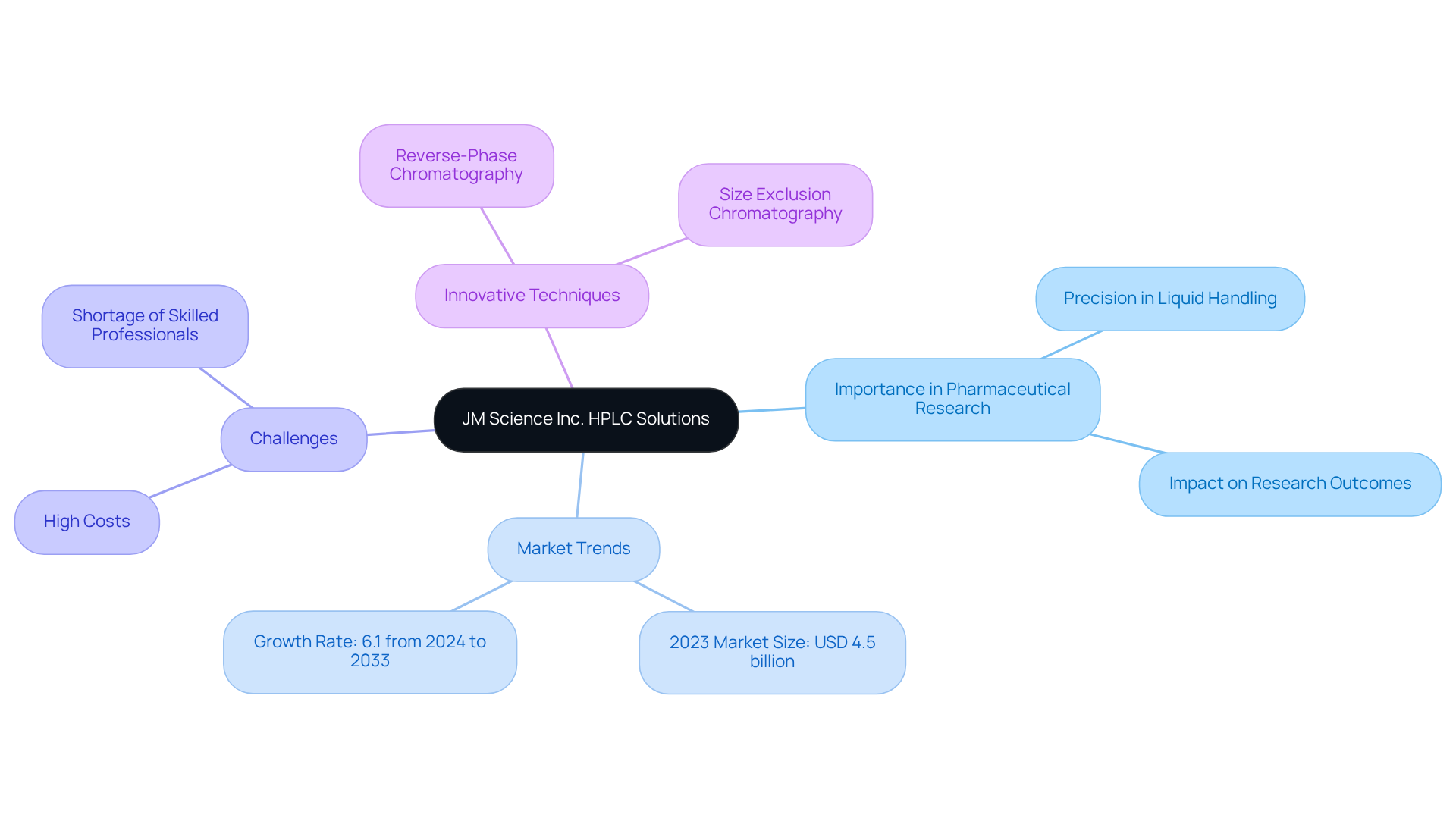
JM Science Inc. Karl Fischer Titrators: Accurate Moisture Analysis
Karl Fischer titrators from JM Science Inc. are recognized for their exceptional accuracy in moisture analysis, capable of detecting water content as low as 0.001%. This level of precision is essential in industries such as pharmaceuticals and food, where moisture levels directly influence product quality and stability. The advanced technology employed in these titrators guarantees accurate endpoint detection and reliable results, establishing them as the preferred choice for facilities dedicated to quality assurance and regulatory compliance.
Moreover, JM Science enhances the titration experience by providing comprehensive support, including:
- 24/7 chat assistance
- Direct call services for obtaining sample reports
- High-quality reagents
This commitment ensures a seamless and efficient titration process. The Karl Fischer titrators market is projected to reach USD 328.5 million by 2030, growing at a CAGR of 2.47% during the forecast period from 2024 to 2030, underscoring the rising demand for precise moisture analysis.
In a competitive landscape featuring major players like Mettler-Toledo and Thermo Fisher Scientific, JM Science Inc. distinguishes itself by delivering innovative solutions and exceptional customer service. This combination of accuracy, support, and market foresight positions JM Science as a leader in moisture analysis technology.
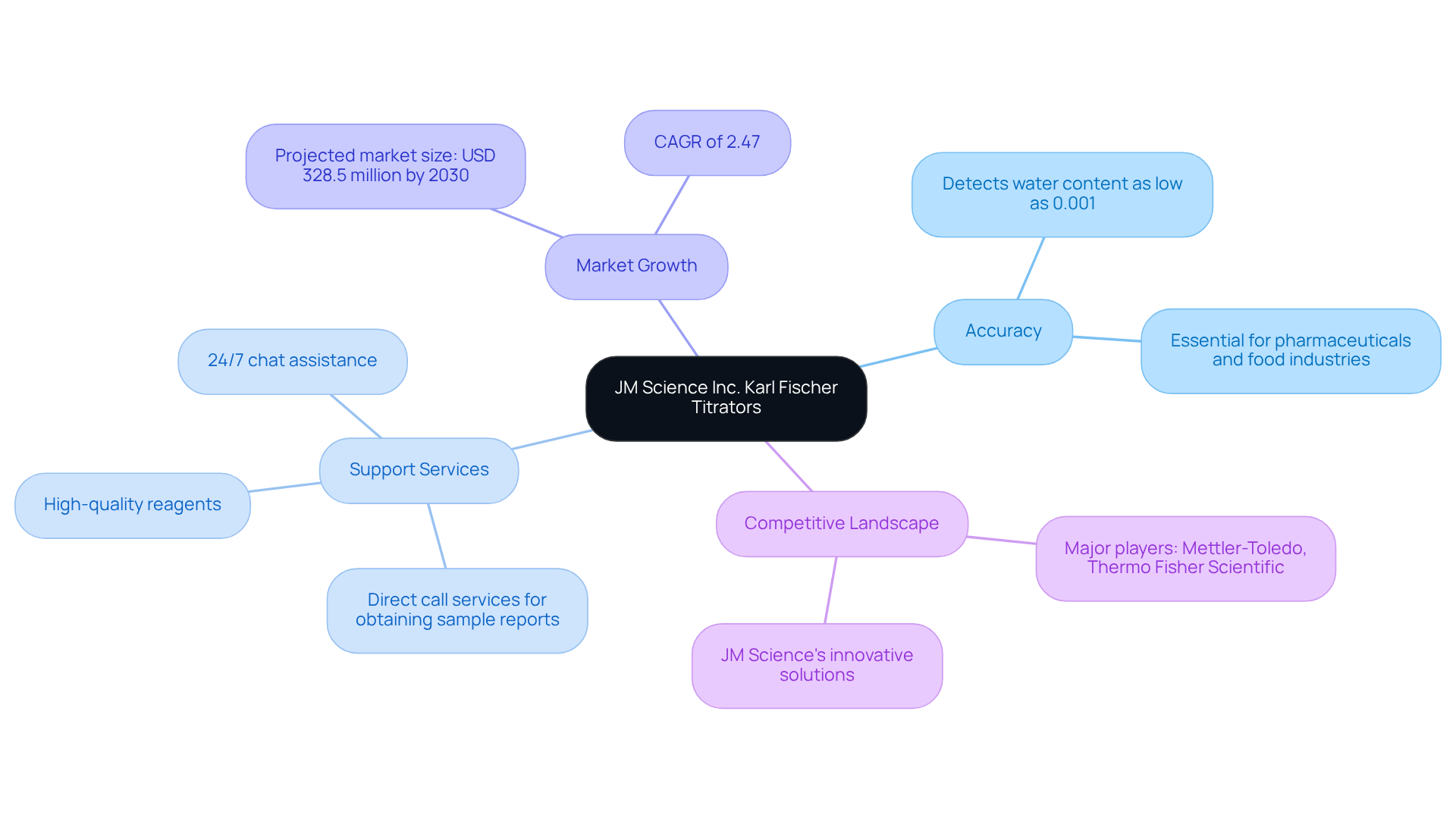
Agilent Technologies Liquid Handling Systems: Streamlined Workflow Solutions
Agilent Technologies presents a diverse array of automated liquid handling instruments, meticulously designed to enhance workflow processes within research environments. These systems are characterized by their adaptability and precision, enabling facilities to execute complex sample preparation tasks effortlessly.
Agilent's solutions, which include automated liquid handling instruments, significantly reduce human error and enhance throughput by automating repetitive functions, allowing researchers to focus on more critical elements of their work. The integration of automated liquid handling instruments into research operations not only elevates productivity but also enhances data reliability, making these instruments indispensable tools for research institutions.
Notably, the global market for automated fluid management solutions was valued at USD 4,692 million in 2022 and is projected to reach USD 6,521 million by 2030, underscoring the rising demand for such technologies in research settings.
Laboratory managers have observed that automated liquid handling instruments streamline workflows, reduce manual labor, and ultimately foster improved decision-making in research environments. As automation becomes increasingly vital for maintaining competitiveness, Agilent's innovative solutions stand out as pivotal contributors to enhancing efficiency and effectiveness in research settings.
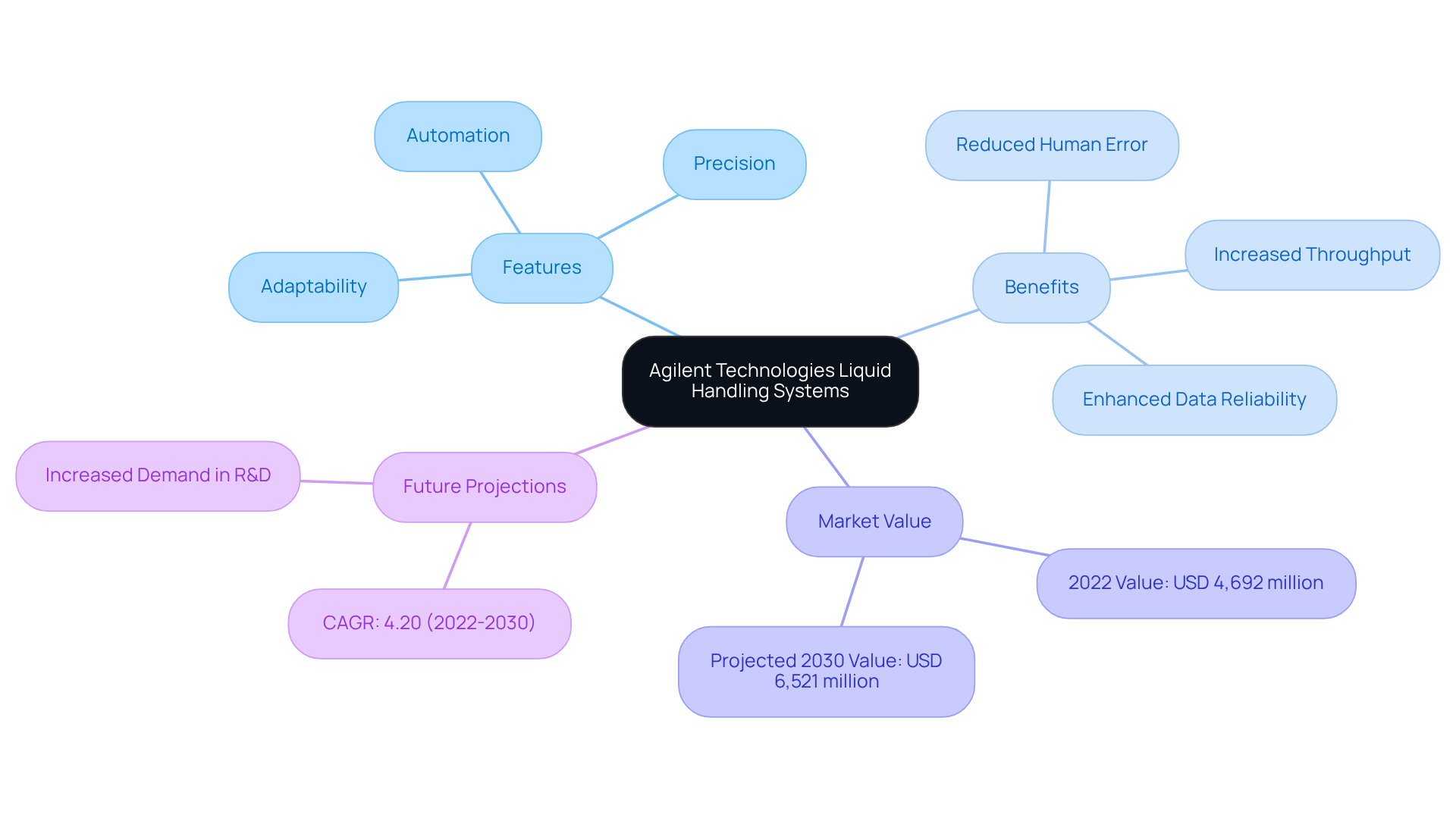
Thermo Fisher Scientific Liquid Handling Instruments: Trusted Performance
Thermo Fisher Scientific offers a robust array of fluid management tools, recognized for their dependable performance in research environments. These automated liquid handling instruments are designed to address a broad range of applications, from basic pipetting tasks to complex automated workflows. Designed with meticulous attention to detail, Thermo Fisher's solutions enhance accuracy and usability, making them indispensable for facilities committed to upholding high research standards.
Recent user satisfaction data indicates that a significant majority of scientific professionals experience improved efficiency and reliability when utilizing these advanced fluid management technologies. Furthermore, expert insights underscore the critical role of maintaining quality standards in research settings, emphasizing the necessity of integrating automated liquid handling instruments as innovative fluid management solutions to optimize workflows and outcomes.
Notably, the incorporation of Laboratory Information Management Systems (LIMS) has further bolstered efficiency through data integration and real-time monitoring, demonstrating the vital role these tools play in refining operational processes.
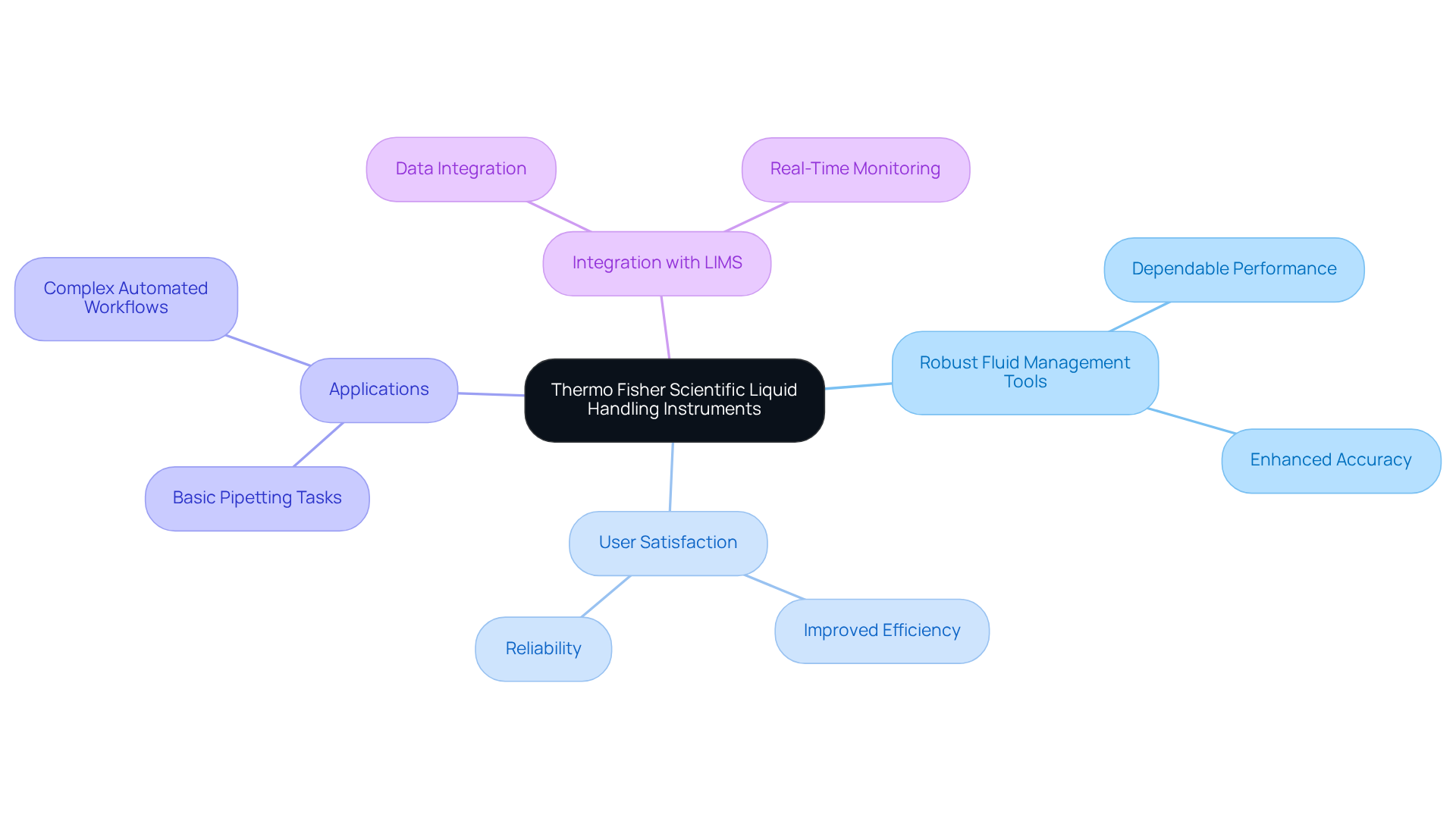
Eppendorf Liquid Handling Solutions: User-Friendly Automation
Eppendorf's fluid handling solutions are designed with user-friendliness at their core, making them accessible to research staff across all skill levels. Their automated liquid handling instruments, such as the epMotion series, simplify routine tasks, enabling consistent and precise fluid transfers. This ease of use not only enhances productivity but also minimizes the learning curve for new employees, ensuring facilities can maintain high throughput without sacrificing quality.
Studies reveal that user-friendly liquid handling solutions can reduce training time by as much as 30%, facilitating faster integration of new employees into workflow processes. Furthermore, real-world examples illustrate that laboratories utilizing Eppendorf's systems have experienced a notable increase in operational efficiency, with some facilities reporting productivity improvements exceeding 25%.
Eppendorf's commitment to innovation ensures that their automated liquid handling instruments are at the forefront of automation technology, thereby enhancing operational efficiency and effectiveness. As industry leaders emphasize, automated liquid handling instruments are revolutionizing work environments, enabling staff to concentrate on more complex tasks while routine processes are managed seamlessly.
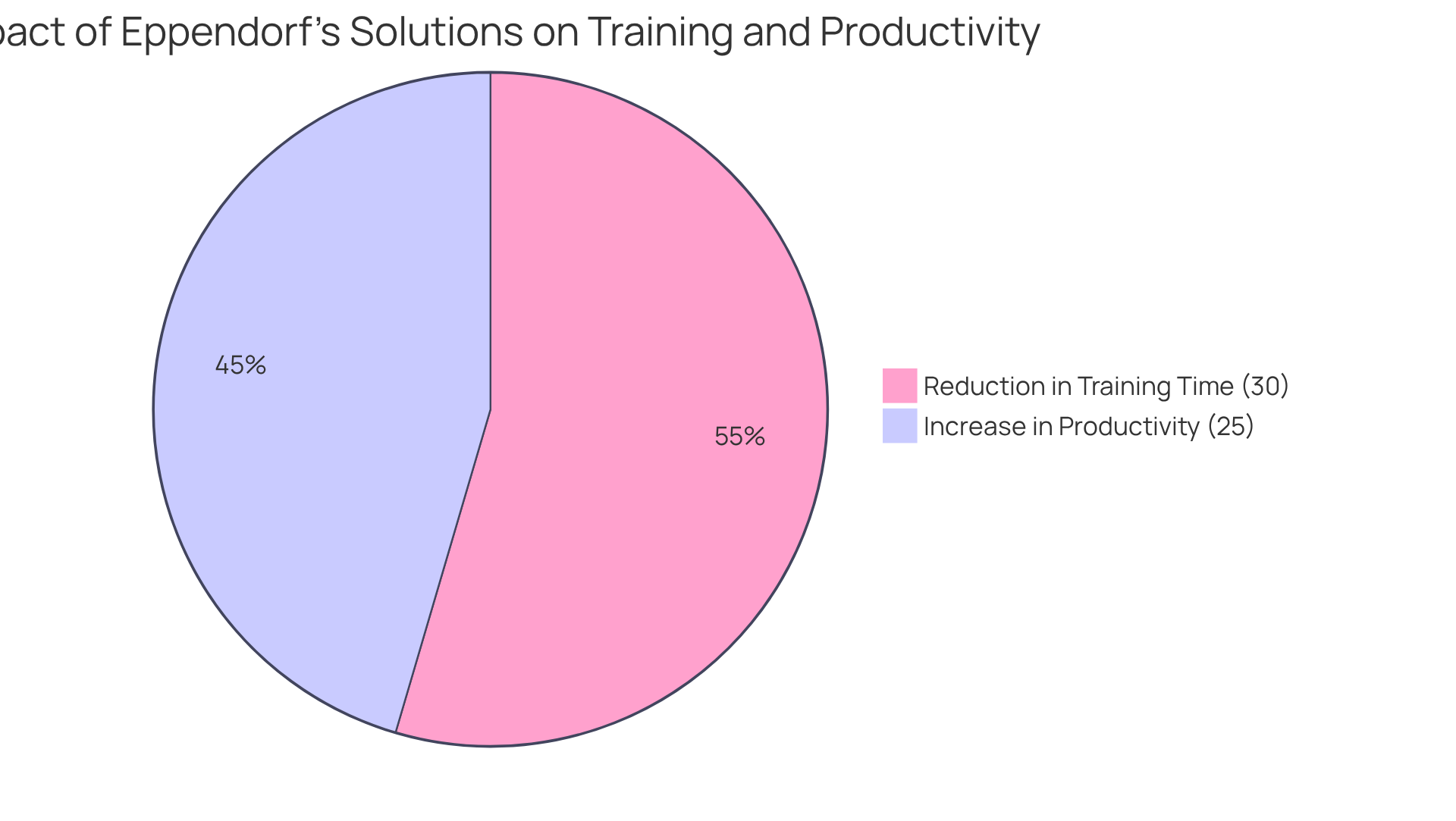
Hamilton Robotics Liquid Handling Systems: Compliance and Data Integrity
Hamilton Robotics presents fluid management solutions meticulously crafted to fulfill the stringent compliance requirements of regulated laboratories. These systems boast advanced features that guarantee data integrity and traceability—critical components for meeting industry standards. By using automated liquid handling instruments, Hamilton's solutions significantly reduce the risk of human error, thereby bolstering the reliability of experimental data. This unwavering commitment to compliance and data integrity positions Hamilton Robotics as a trusted partner for facilities engaged in vital research and development activities.
As we approach 2025, the significance of data integrity continues to escalate, particularly given that 95% of non-compliance cases arise from inadequate data management. The adoption of automated liquid handling instruments is increasingly essential for sustaining both operational excellence and regulatory compliance. Siegfried Schmitt, vice president at Parexel, aptly states, 'Speedier implementation of the Post-Approval Change Management Protocol is essential for it to have a positive effect on supply security.' Furthermore, the Hamilton Robotics VANTAGE Liquid Handling Platform showcases how automated liquid handling instruments can enhance sophisticated analytical methods, improving data integrity and compliance, thus making it an invaluable asset for research facilities.
Lab managers must also prioritize the implementation of robust data management practices, such as:
- Conducting regular audits
- Providing staff training
to further ensure compliance and uphold data integrity.
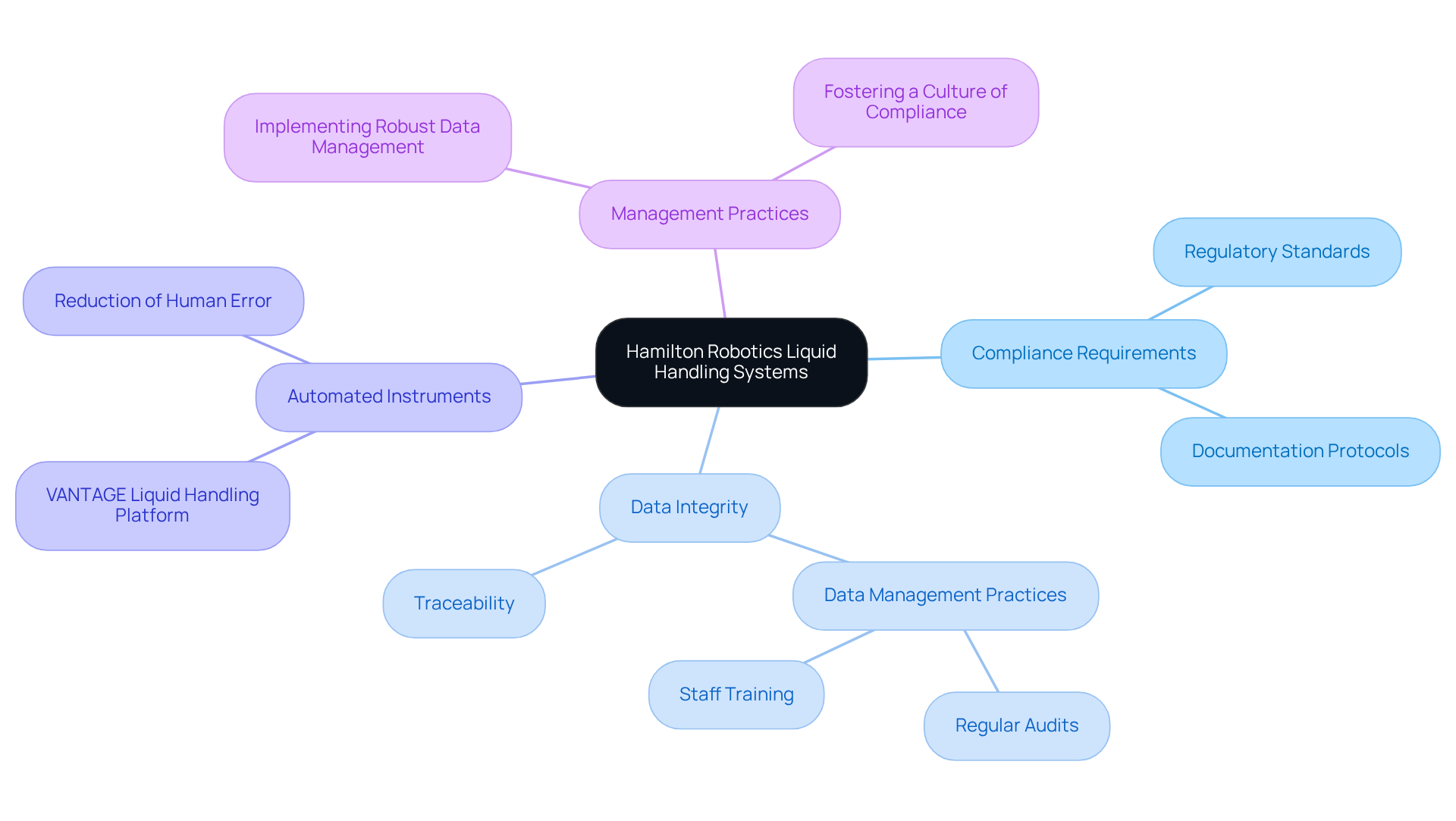
Tecan Liquid Handling Platforms: Scalable and Integrative Solutions
Tecan's automated liquid handling instruments exemplify scalability and integration, empowering facilities to customize workflows to meet their unique needs. The Freedom EVO 150 instrument, featuring an eight-channel Liquid Handling Arm, underscores Tecan's dedication to versatility, accommodating a diverse array of applications from high-throughput screening to complex assay configurations.
As Frans noted, "The first protocol we chose to automate was our vitamin B1/B6 workflow, as this is one of our most frequently requested assays, and is very complex to perform manually." This statement highlights the critical role of customizable workflows in achieving substantial enhancements in throughput and reproducibility.
Moreover, as laboratories increasingly seek adaptable solutions, Tecan's emphasis on flexibility in its automated liquid handling instruments positions it as a frontrunner in the dynamic realm of laboratory automation.
It is imperative for lab managers to assess the specific power supplies and HVAC systems necessary for automated laboratories, as these environments can require up to ten times the energy of conventional setups.
By integrating cutting-edge technologies, Tecan not only elevates the efficiency of automated liquid handling instruments but also improves accuracy, rendering these platforms indispensable for research facilities.
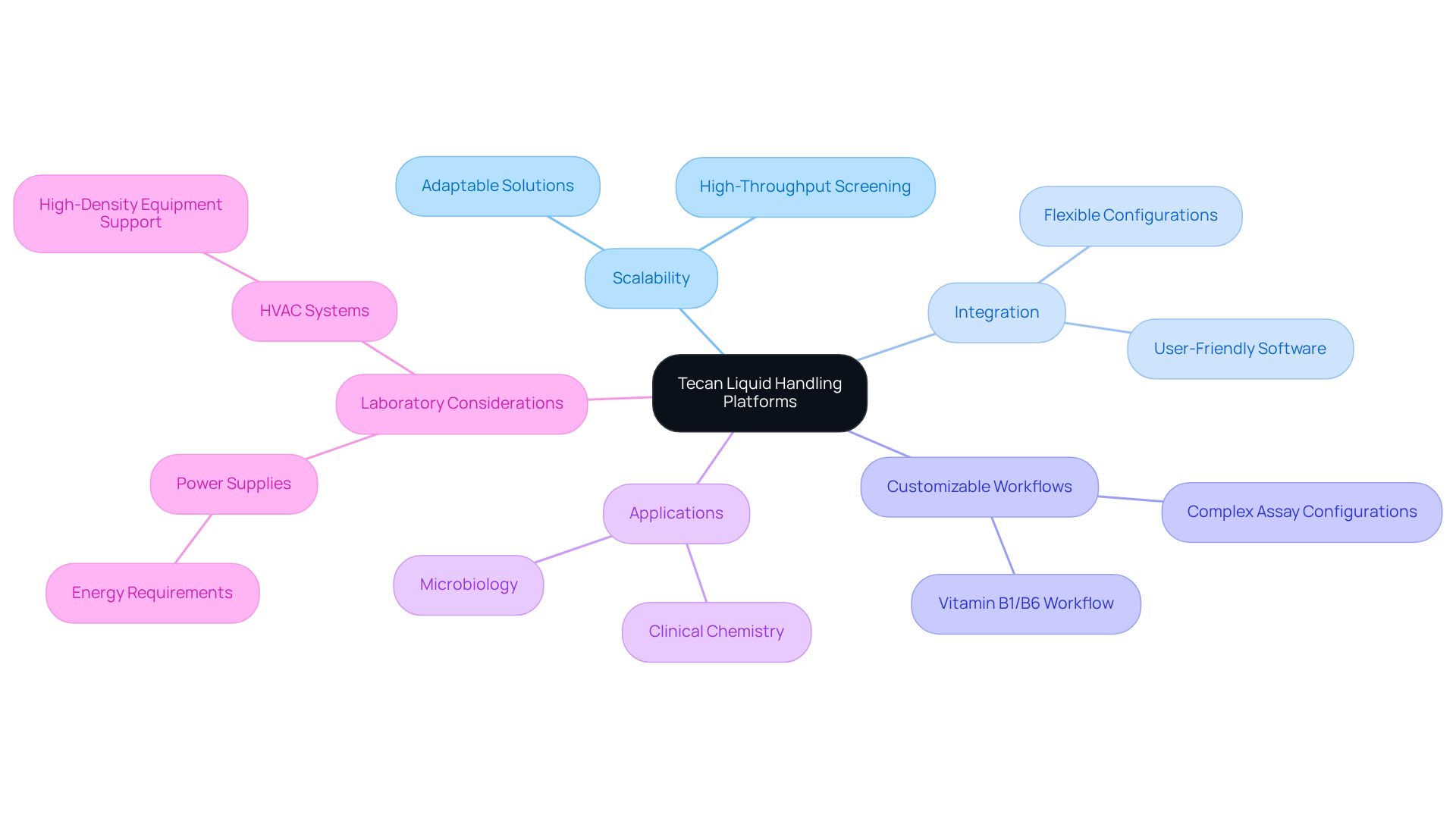
PerkinElmer Liquid Handling Instruments: Comprehensive Support Services
PerkinElmer presents an impressive array of fluid management instruments, complemented by comprehensive assistance services that ensure optimal performance and reliability. Their unwavering commitment to customer service encompasses training, maintenance, and troubleshooting—essential elements for extending the lifespan of scientific equipment. By delivering robust support, PerkinElmer empowers facilities to maintain high standards of precision and efficiency in their fluid processing operations. This strong focus on customer satisfaction not only enhances operational effectiveness but also solidifies their reputation as a leading provider of analytical solutions.
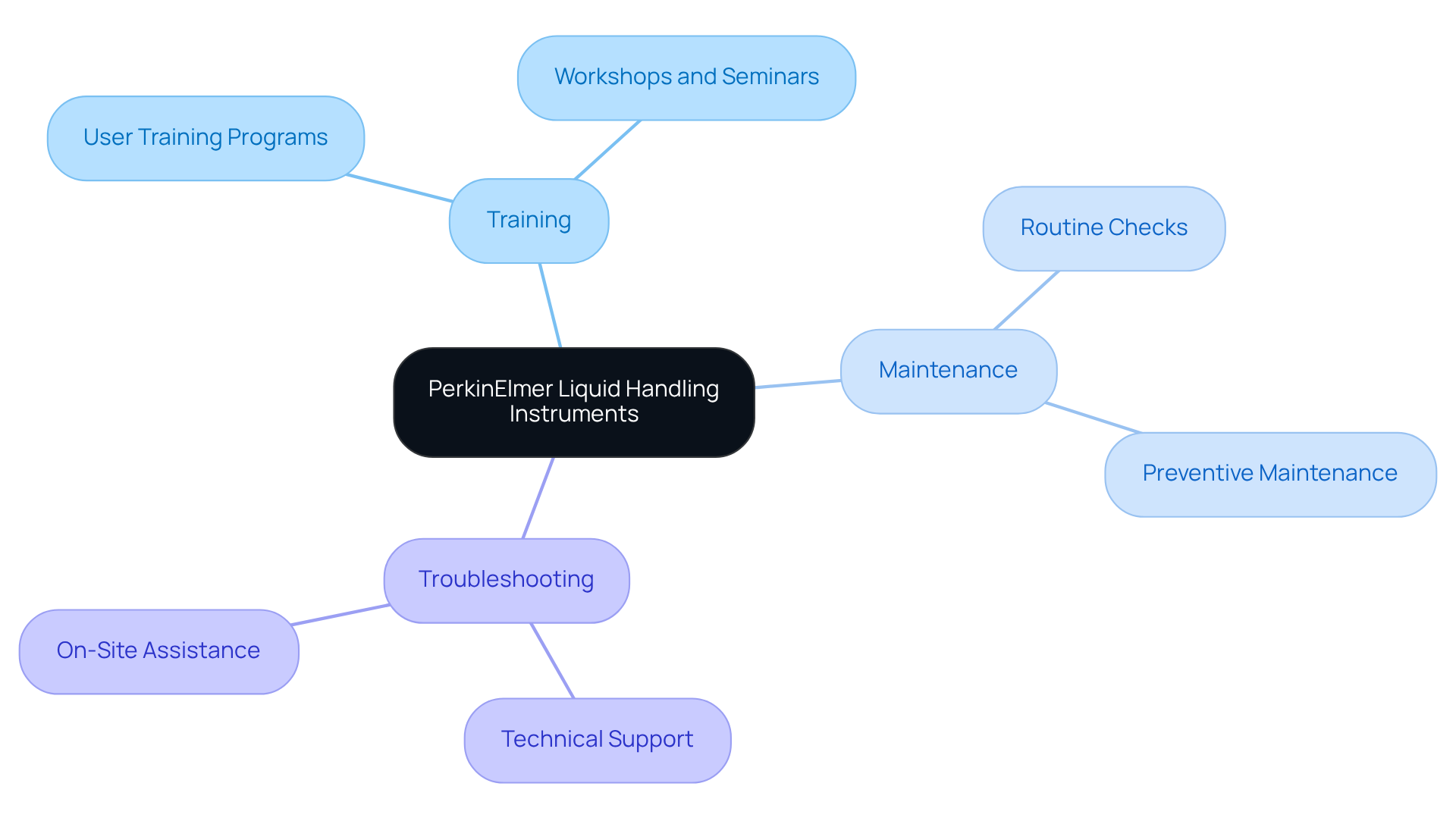
BioTek Instruments Liquid Handling Solutions: Enhanced Analytical Capabilities
BioTek Instruments presents cutting-edge fluid handling solutions that significantly enhance analytical capabilities in research facilities. Their systems are meticulously engineered to utilize automated liquid handling instruments, automating complex workflows, facilitating precise fluid transfers, and optimizing assay performance. By harnessing advanced technologies, BioTek's solutions empower researchers to achieve unparalleled accuracy and reproducibility in their experiments. This commitment to elevating analytical capabilities not only streamlines laboratory processes but also positions BioTek as an indispensable partner for facilities aiming to advance their research and development initiatives.
Recent studies indicate that laboratories utilizing automated liquid handling instruments can experience assay performance improvements of up to 30%, underscoring the transformative impact of automation on scientific research. Nevertheless, the substantial costs associated with these systems can pose challenges for smaller research facilities, potentially limiting their ability to adopt such sophisticated technologies.
The fluid management market is projected to experience significant growth, reaching USD 7.4 billion by 2030, with a compound annual growth rate (CAGR) of 8.0%, highlighting the increasing importance of automated liquid handling instruments in enhancing efficiency within research environments.
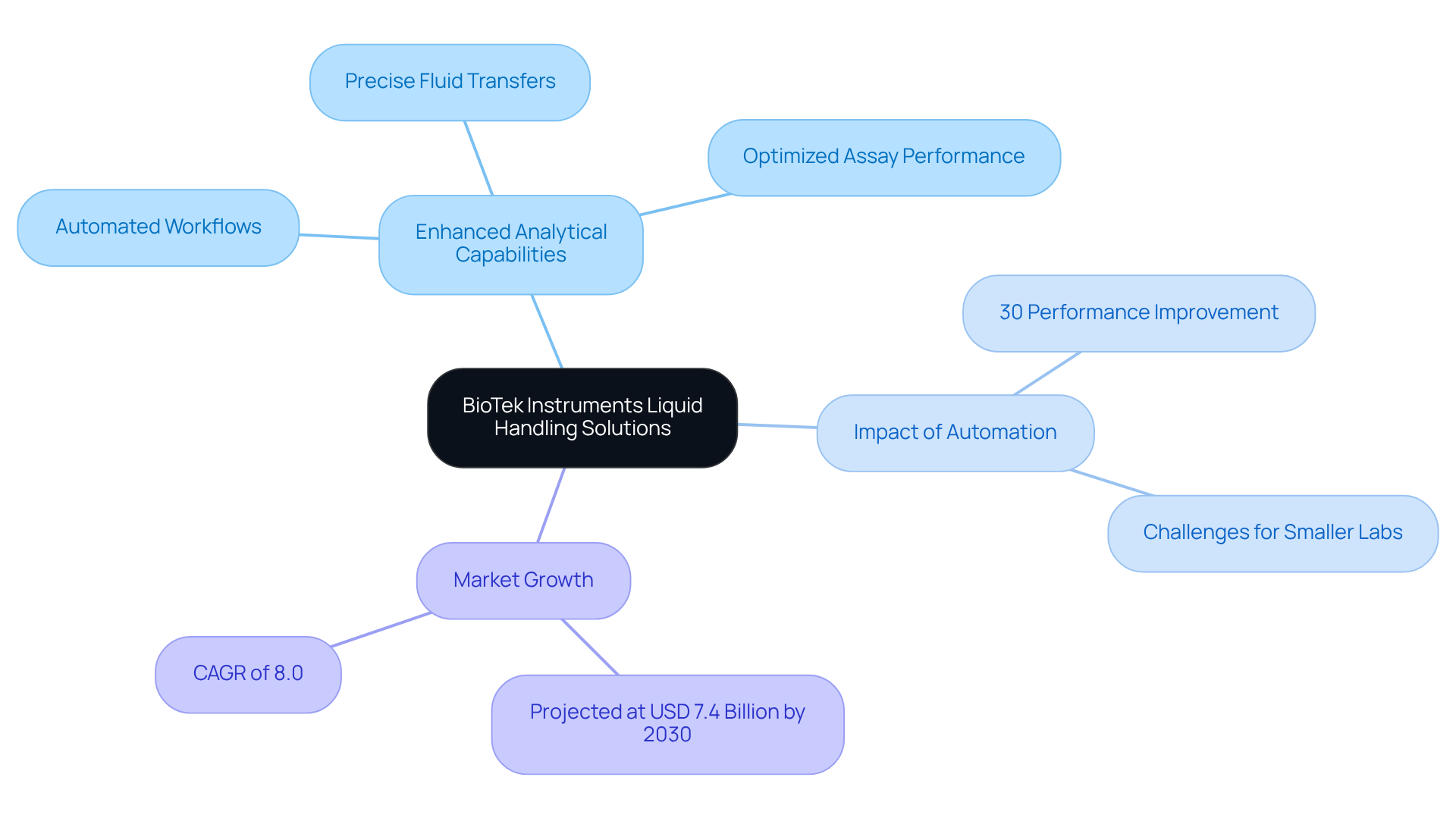
Sartorius Liquid Handling Systems: Innovative Technology for Modern Labs
Sartorius fluid management technologies exemplify cutting-edge innovation, equipping contemporary laboratories with advanced solutions that significantly improve fluid management efficiency. These meticulously designed frameworks enhance precision and reduce contamination risks—an essential factor in maintaining the integrity of experimental outcomes.
Statistics reveal that manual liquid handling processes can lead to contamination rates as high as 30%, whereas automated systems substantially mitigate these risks, ensuring cleaner workflows. By leveraging state-of-the-art technology, Sartorius empowers research facilities to streamline their operations, boost productivity, and uphold high standards of quality.
This unwavering commitment to innovation solidifies Sartorius's position as a leader in laboratory automation, making it an invaluable partner for research institutions aiming to optimize their processes and outcomes.
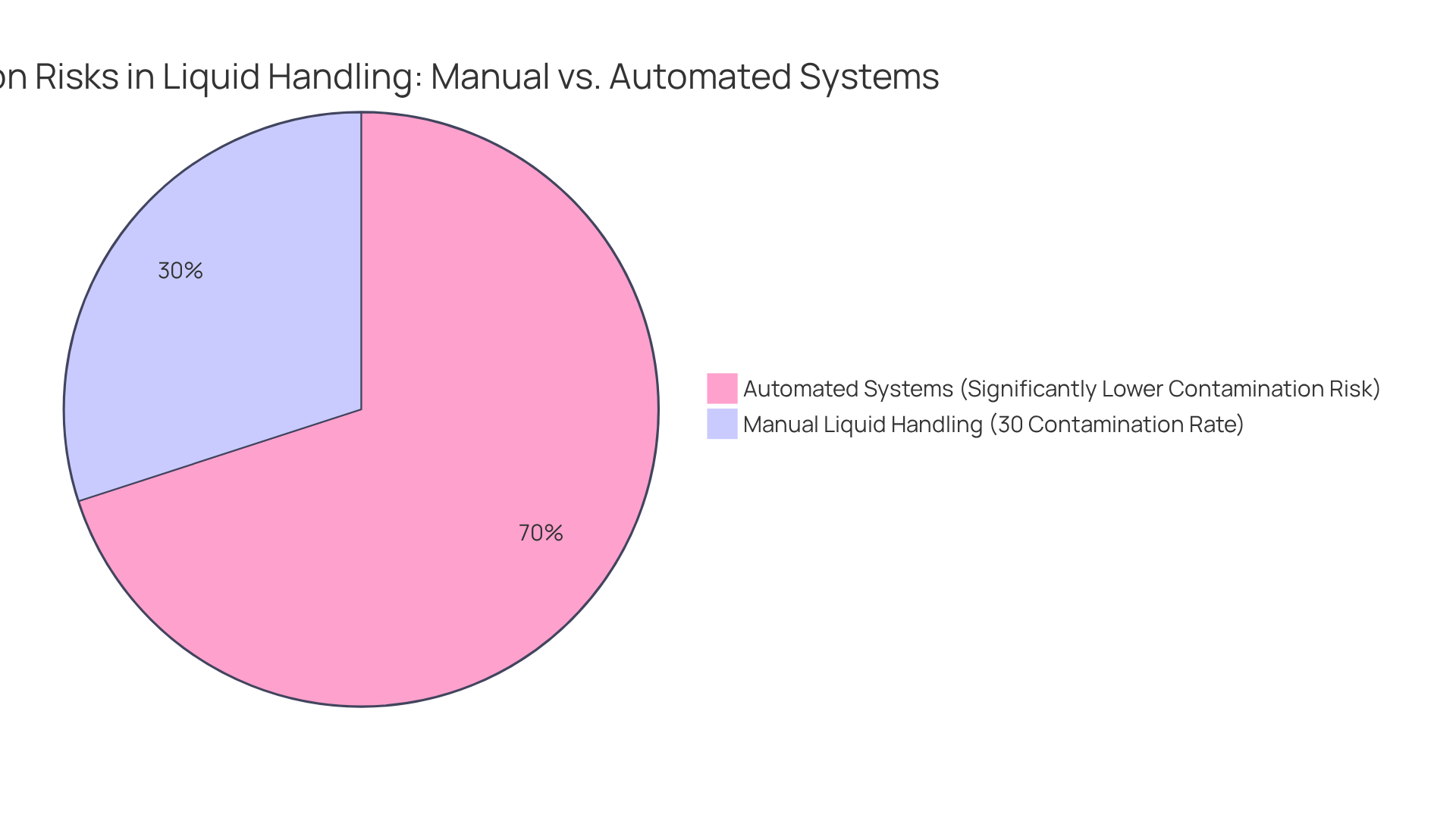
Conclusion
The exploration of automated liquid handling instruments underscores their critical role in enhancing laboratory efficiency and precision. These advanced technologies streamline workflows and significantly reduce human error, ensuring reliable and reproducible results across various research environments. As the demand for high-quality analytical solutions rises, integrating these systems becomes indispensable for laboratories striving to maintain competitiveness in their respective fields.
Key insights from the article highlight the diverse offerings from leading manufacturers such as:
- JM Science
- Agilent Technologies
- Thermo Fisher Scientific
Each contributing unique innovations that cater to specific laboratory needs. From JM Science's HPLC solutions to Eppendorf's user-friendly automation, these instruments address challenges ranging from moisture analysis to complex sample preparation. The projected growth of the automated liquid handling market emphasizes the ongoing necessity for these technologies, with significant advancements anticipated in the coming years.
As laboratories look toward the future, embracing automated liquid handling instruments is not merely a choice but a necessity for sustaining operational excellence and enhancing research outcomes. By prioritizing the adoption of these innovative solutions, facilities can ensure they remain at the forefront of scientific progress, ultimately driving advancements that benefit the broader community. Investing in automation today paves the way for a more efficient, accurate, and productive tomorrow in laboratory research.




